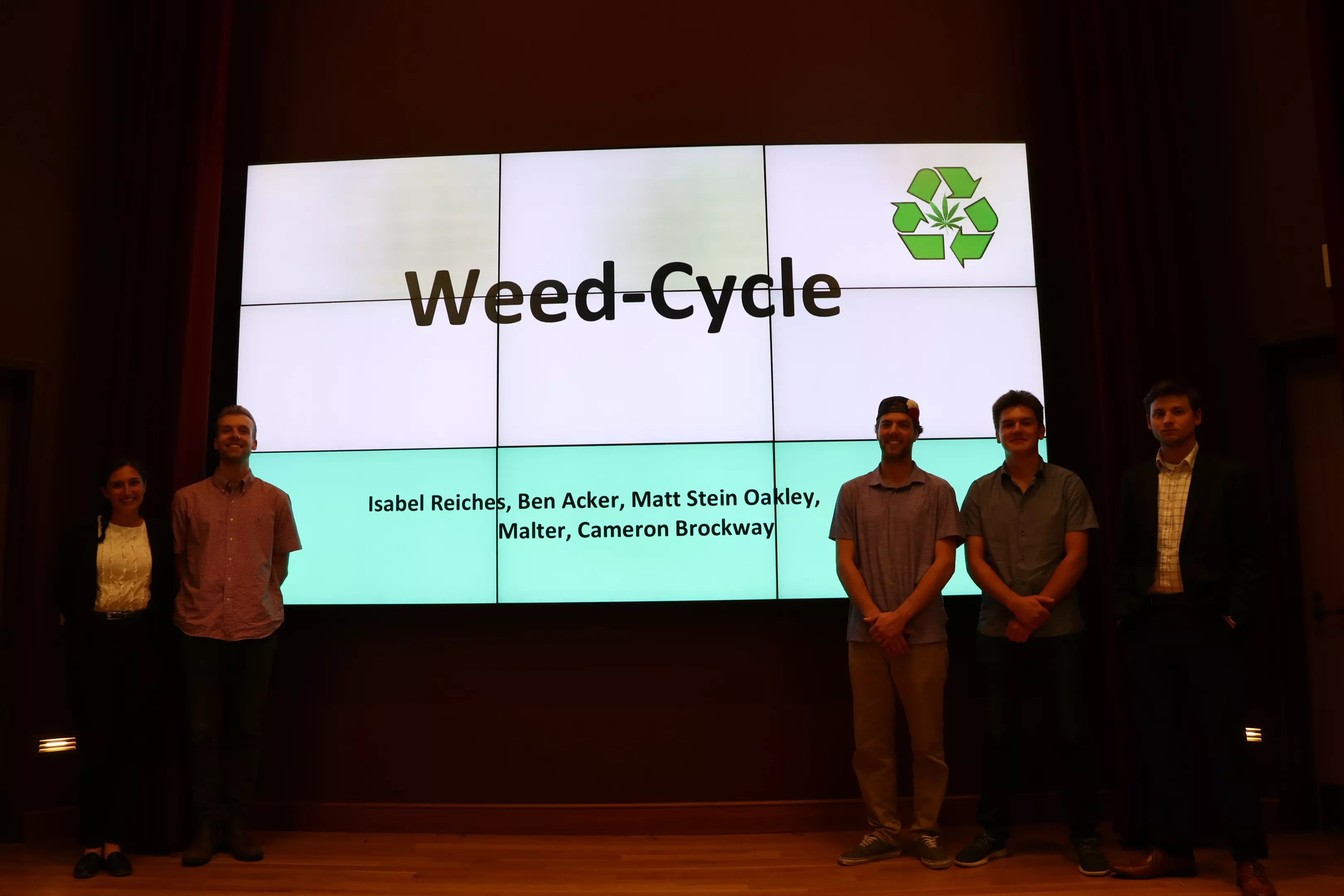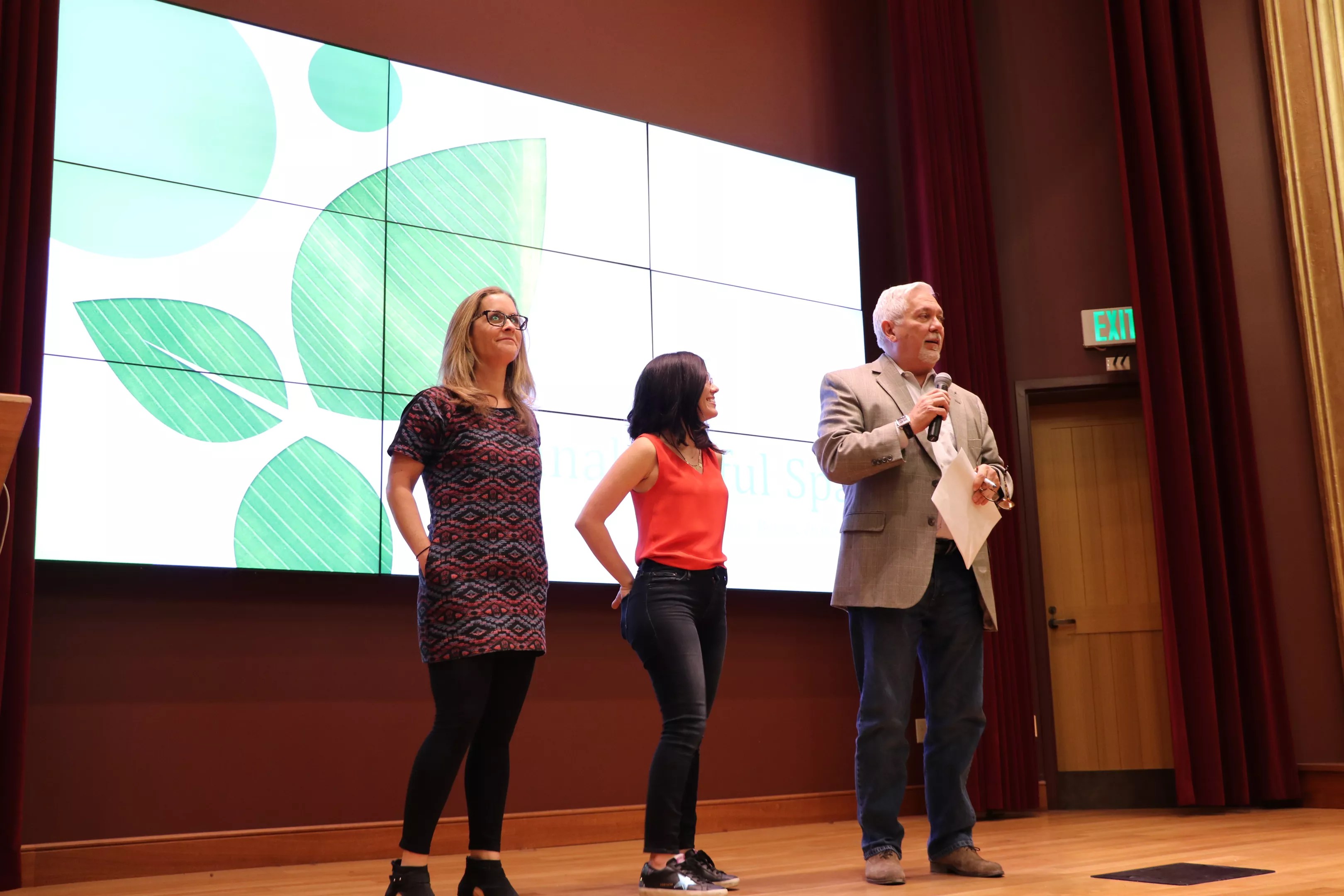
Nina Petrovic

Audio By Carbonatix
Cannabis continues to gain influence, not only in new business ventures, but in college education, too. Just take a peak inside professor Paul Seaborn’s Business of Marijuana course, where students at the Daniels College of Business at the University of Denver took part in a potrepreneur pitch competition June 4.
Five teams of undergraduate and graduate DU students proposed new business ideas to a panel of cannabis industry judges including Julie Berliner, founder and CEO of edible company Sweet Grass Kitchen; Mark Grindeland, CEO and co-founder of Coda Signature edibles; and Carter Davidson, an executive at Vangst recruiting and staffing.
“From the time I joined DU in 2011, I just saw more and more interesting things taking place that were of interest to students. I had more and more students asking me, because of my business-government background, about the [cannabis] industry and wanting to do more projects on it and bringing in guest speakers,” Seaborn remembers. “To me, it seemed like an obvious thing that I was going to do, and I had to be quick before someone else beat me to it.”
But Seaborn is leaving DU at the end to the school year to take a position at the University of Virginia this summer, making the latest pitch contest his last – but it was hardly his most boring, with students presenting businesses based around pot business consulting, social consumption, recycled soil and cannabis spa treatments and nutrition.
“If you think you have a solution, go out and see if your idea is actually solving a problem,” Davidson told students. “A lot of businesses start by looking at a personal problem and realizing a lot of people have the same issue.”
For the first team, Weed-Cycle, that problem was sustainability, envisioning a company that would take used soil from cannabis grows and remove dead organic matter by burning it in dirt-sterilization ovens. The soil would then be treated for repurchase and delivered to grow facilities in the Denver area. However, a successful business requires more than a cool idea, with Grindeland and Berliner asking questions about profit margins and transportation.
“Is it better to deliver the message softly, or is it better to hear direct feedback?” Grindeland asked students. “Be prepared to hear a lot of ‘No’ when starting a business.”
Other pitch groups wanted to jump on social pot use, which could become a viable industry after Governor Jared Polis signed a law that will regulate such businesses by 2020. The proposed Cannabis Collective was inspired by the popular food hall concept, allowing cannabis consumption in a cafeteria-like setting with multiple restaurants and games, similar to establishments like the Source and Avanti in Denver.

Professor Paul Seaborn talks to his Business of Marijuana students during his final year at DU.
Nina Petrovic
Another group interested in social use wanted to focus on wellness, creating Cannablissful Spa, where customers could use CBD and THC products while enjoying regular spa treatments like massages and pedicures. Unlike the first two teams, Cannablissful Spa opted to locate the company in Boulder, a community known for wealthy tourists and healthy living. Their goal was to create a space where customers, especially those new to consuming cannabis, can feel comfortable and safe while consuming. Revenue would be generated through massage services, membership fees and limited retail pot sales.
Elevated Nutrition, the proposed cannabis nutrition company, opted to be located in Aspen, where it would produce CBD-infused food and tinctures aimed at athletes along with exercise plans and diet guides. However, the panel of judges noted to be wary about making health claims with CBD, which currently sits on shaky ground with the Food and Drug Administration.
Although not as sexy as the first four pitch groups, the proposed Pioneer Consulting Group wanted to cash in on the lack of education surrounding the cannabis industry – a common and successful idea in a trade marred by different regulations from state to state. The firm would provide business analyses and recommendations to investors and businesses in cannabis, providing market, competitive, internal and legal analysis as well as giving recommendations to cannabis companies on whom to partner with.
After all five presentations were completed, the panel decided that Cannablissful Spa was the only business with potential value for funding, believing the social consumption, tourism and wellness sectors was a good mix for potential profits.
Although this is likely to be the final offering of the Business of Marijuana class at DU (the class isn’t scheduled for the 2019 fall semester as of now), Seaborn hopes that courses on cannabis will continue to be taught in colleges in Denver and elsewhere.
“This industry is unique in so many ways, from state regulations to the way it’s taxed. And we know so little about how it’s going to look that it’s not something you can just integrate with other courses,” he says. “I would think there is opportunity to expand into some broader programs, whether it’s a certificate or a major or a degree program.”